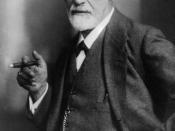Throughout history, the human being has undergone several adaptive and scientific advances. Psychology stems from the root of that scientific proliferation, the science of behavior, the mind, and the relationship of life and mind to the functions of the body. Sigmund Freud, the father of "modern" psychology proposed the Psychoanalytic theory; the first widely accepted and practiced theory in psychology. This theory explains the general causes of behavior, mental disorders such as DID0 and whether the scientific method is accurate in categorization.
The psychoanalytic theory attempts to explain the root of behavior and several mental disorders. This theory, originally developed by Sigmund Freud, encompasses the constant ongoing conflict between the "id, ego and the superego," (pg 580) in a person's daily life, and how the unconscious mind influences our personality. The metaphor commonly associated with Freud's psychoanalytic theory is the iceberg in the water, the human mind is only consciously aware of part of itself (the tip of the iceberg), while the unconscious is submerged or more complex but inaccessible by normal means.
(Fig 41.1) According to the theory, "[t]he id, has a reservoir of unconscious psychic energy constantly striving to satisfy basic drives to survive, reproduce and aggress" (pg 580). While the ego, "[helps people learn] to cope with the real world" (pg 580), and the superego, "forces the ego to consider not only the real but the ideal" (pg 580). The id's constant use of the "pleasure principle," (pg 580) which is "instant gratification," (pg 580) of it's desires, forces an immediate conflict with the adjacent ego and superego parts and rationality of demands. Following unconscious desires, the ego (immediate consciousness) and the superego (the conscience) must turn immediate needs into attainable and realistic goals, or face immediate danger or reprisal. This systemic behavioral process mediates...


